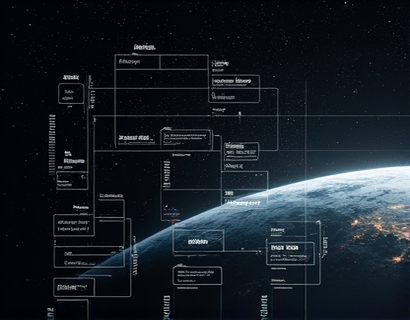Decentralized DAO Management: Transforming Governance with Advanced Analytics Software
In the rapidly evolving landscape of decentralized finance and autonomous organizations, the role of governance has become increasingly complex and critical. Decentralized Autonomous Organizations (DAOs) represent a novel approach to governance, leveraging blockchain technology to create transparent, community-driven entities. However, managing a DAO effectively requires robust tools and strategies to handle the intricate processes involved. Advanced analytics software is emerging as a transformative solution, offering DAO managers and administrators the means to streamline governance, enhance collaboration, and drive sustainable growth through data-driven decisions.
Understanding DAO Governance
Before delving into the role of advanced analytics software, it's essential to understand the fundamentals of DAO governance. A DAO is a self-governing organization where decisions are made collectively by its members, typically through a smart contract on a blockchain. This decentralized structure eliminates the need for a central authority, promoting transparency and equality among participants. However, this also introduces challenges such as decision-making complexity, lack of centralized oversight, and the need for efficient communication channels.
The governance process in a DAO involves several key components: proposal and voting mechanisms, role assignment, and transaction execution. Proposals are submitted by members and must be voted on by the community. Once a proposal gains sufficient support, it is executed by the smart contract. Role assignment ensures that different members have specific responsibilities, which can range from proposal creation to financial management. Transaction execution is automated through smart contracts, ensuring that decisions are implemented promptly and transparently.
Challenges in DAO Governance
Despite its potential, DAO governance faces several challenges that can hinder its effectiveness. One major issue is the complexity of decision-making in a decentralized environment. With numerous stakeholders involved, reaching a consensus can be time-consuming and difficult. Additionally, the lack of a central authority means that there is no single point of contact for resolving disputes or making urgent decisions. This can lead to delays and inefficiencies.
Another significant challenge is the technical barrier. Many DAO participants may not have a deep understanding of blockchain technology and smart contracts, making it hard for them to engage effectively in the governance process. This can result in a lack of participation and a concentration of power among more tech-savvy members. Furthermore, the transparency of DAOs, while a strength, can also be a double-edged sword. Sensitive information, if mishandled, can be exposed to malicious actors.
Role of Advanced Analytics Software
To address these challenges, advanced analytics software is proving to be an invaluable tool for DAO management. These platforms offer a suite of features designed to streamline governance processes, enhance transparency, and provide actionable insights. By leveraging advanced analytics, DAOs can make more informed decisions, improve collaboration, and ensure sustainable growth.
One of the primary benefits of advanced analytics software is its ability to simplify complex governance tasks. For instance, proposal management can be significantly improved. The software can automate the process of collecting and analyzing votes, ensuring that proposals are evaluated based on clear, data-driven criteria. This reduces the risk of human error and bias, leading to more objective and fair decision-making.
Another critical area where analytics software excels is in enhancing collaboration among DAO members. By providing a centralized platform for communication and collaboration, these tools facilitate better coordination and information sharing. Members can easily access relevant data, track the status of proposals, and engage in discussions, all within a single, user-friendly interface. This not only improves efficiency but also fosters a sense of community and shared purpose.
Comprehensive Analytics for Data-Driven Decisions
Advanced analytics software offers comprehensive analytics capabilities that are essential for data-driven governance. These platforms can process and analyze large volumes of data from various sources, including blockchain transactions, member interactions, and external market trends. By transforming this data into actionable insights, DAO managers can make informed decisions that align with the organization's goals and values.
For example, analytics tools can provide real-time monitoring of proposal performance, highlighting which initiatives are gaining traction and which may need more support. This allows for timely adjustments and ensures that resources are allocated effectively. Additionally, sentiment analysis can gauge the community's mood and identify potential issues before they escalate, enabling proactive management.
Financial management is another area where analytics software shines. By tracking transactions and expenses in real-time, DAOs can maintain a clear and transparent financial overview. This helps in budgeting, forecasting, and ensuring that funds are used efficiently. The software can also alert administrators to any anomalies or discrepancies, reducing the risk of fraud and mismanagement.
Enhancing Transparency and Trust
Transparency is a cornerstone of DAO governance, and advanced analytics software plays a crucial role in maintaining and enhancing this transparency. By providing clear and accessible data, these tools ensure that all members can see how decisions are made and how resources are utilized. This level of transparency builds trust among community members and external stakeholders, which is vital for the long-term success of a DAO.
Audit trails are a key feature of analytics software, allowing for a detailed record of all transactions and decisions. This not only helps in compliance with regulatory requirements but also provides a clear history that can be reviewed by anyone. In the event of disputes, having a transparent and verifiable record can help resolve issues more efficiently.
Moreover, analytics software can facilitate better communication by providing dashboards and reports that summarize key metrics and insights. These visual representations make it easier for members to understand complex data, promoting a more informed and engaged community. This, in turn, can lead to higher participation rates and a more robust governance process.
Improving Member Engagement
Member engagement is crucial for the health and growth of a DAO. Advanced analytics software can help boost participation by making the governance process more accessible and interactive. For instance, interactive dashboards and real-time updates keep members informed and involved, encouraging them to participate in proposals and discussions.
The software can also personalize the experience for each member, tailoring notifications and insights based on their interests and roles. This personalized approach ensures that members receive relevant information, increasing the likelihood of their engagement. Additionally, gamification elements, such as rewards for active participation, can be integrated to further motivate members.
Another way analytics software enhances engagement is by identifying and addressing barriers to participation. By analyzing member behavior and feedback, DAOs can identify areas where the process may be discouraging some participants. For example, if certain members are consistently missing proposal deadlines, the software can send reminders or simplify the process to make it more user-friendly.
Driving Sustainable Growth
Sustainable growth is a long-term goal for any DAO, and advanced analytics software is instrumental in achieving this objective. By providing deep insights into the organization's performance, these tools enable DAOs to identify growth opportunities and optimize their strategies.
Market analysis is one such feature that can drive sustainable growth. Analytics software can monitor external market trends, competitor activities, and emerging opportunities, allowing DAOs to stay ahead of the curve. This proactive approach ensures that the organization can adapt to changing conditions and capitalize on new possibilities.
Resource allocation is another critical aspect of sustainable growth. Analytics software can help DAOs optimize their resource usage by providing detailed reports on project performance, cost efficiency, and return on investment. This data-driven approach ensures that resources are directed towards the most impactful initiatives, maximizing the organization's potential.
Furthermore, predictive analytics can forecast future trends and outcomes, enabling DAOs to plan strategically. By understanding potential risks and opportunities, DAOs can make informed decisions that support long-term sustainability. This forward-looking perspective is essential for navigating the dynamic landscape of decentralized ecosystems.
Case Studies and Real-World Applications
Several DAOs have successfully implemented advanced analytics software to transform their governance processes. One notable example is a decentralized finance (DeFi) DAO that used analytics tools to streamline its proposal and voting mechanisms. By automating the collection and analysis of votes, the DAO reduced the time required to approve proposals from weeks to mere hours. This not only increased efficiency but also enhanced member satisfaction, leading to higher participation rates.
Another case involves a community-driven content platform DAO that leveraged analytics to manage its content creation and distribution. The software provided insights into the most popular content types and audience preferences, allowing the DAO to focus on high-demand areas. This data-driven approach resulted in increased engagement and revenue, demonstrating the tangible benefits of advanced analytics in governance.
These case studies highlight the practical applications and positive outcomes of integrating advanced analytics software into DAO management. By adopting these tools, DAOs can overcome traditional governance challenges and unlock new levels of efficiency, transparency, and growth.
Conclusion
In conclusion, advanced analytics software is revolutionizing DAO governance by addressing key challenges and providing powerful tools for data-driven decision-making. From simplifying proposal management to enhancing transparency and member engagement, these platforms offer comprehensive solutions that drive sustainable growth. As the decentralized ecosystem continues to evolve, the role of analytics software will become increasingly vital in ensuring the success and resilience of DAOs. By embracing these advanced tools, DAO managers and administrators can unlock the full potential of their organizations, fostering a more inclusive, efficient, and prosperous decentralized future.










































